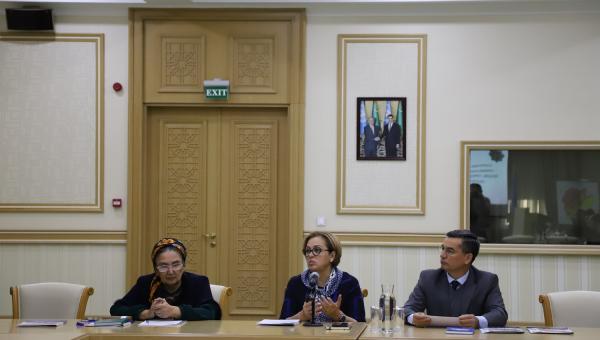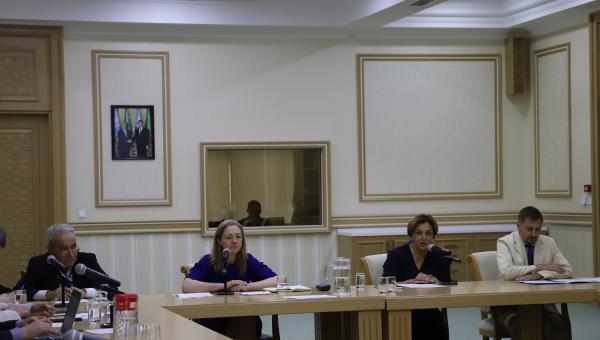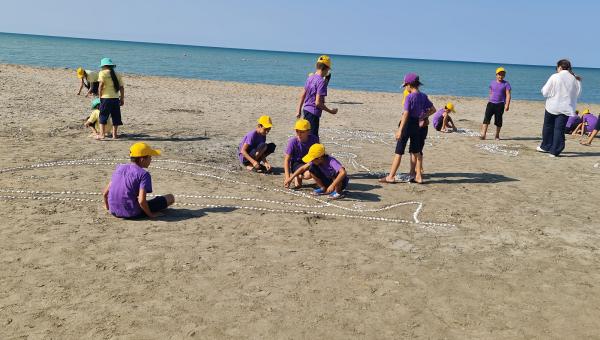UNDP Turkmenistan
RESILIENCE, CLIMATE AND ENERGY
Programme at a glance
In Turkmenistan, UNDP supports the implementation of the country’s obligations under Multilateral Environmental Agreements (MEAs) and helps to integrate environmental issues into national and sectoral plans and strategies; secure resources; and implement programmes that promote inclusive, sustainable development, and enhance national resilience and adaptation capacity to adverse effects of climate change.
We collaborate with national partners to mitigate the adverse effects of climate change, adapt to them and promote the implementation of national environmental programmes. UNDP also supports the government in strengthening national policy and the legal environment by providing expertise that enables to reduce disaster risks, greenhouse gas emissions and promotes energy efficiency, the use of renewable energy, sustainable urban development and household waste management, as well as biodiversity conservation, sustainable land use and water management.
We represent one of the country’s most extensive environment programmes and remain the primary delivery agent for major international funds such as the Green Climate Fund (GCF) and the Global Environment Facility (GEF). In line with the Agenda 2030, we are working with local communities to find sustainable solutions to climate change's pressing needs and challenges.
The country's main strategic document in climate change - the National Strategy of Turkmenistan on Climate Change- was developed with UNDP’s full engagement and adopted on 15 June 2012, which gave a serious impetus to strengthening activities on climate change issues in Turkmenistan.
As part of its advocacy for Paris Agreement, which was ratified by the country in October 2016, and in accordance with the country’s obligations under this Agreement, the National Strategy of Turkmenistan on Climate Change was also revised with UNDP support and approved in a new edition by the Decree of the President of Turkmenistan in September 2019.
In accordance with the commitments under the Paris Agreement on Climate Change, on 12 May 2022 the government of Turkmenistan approved an updated Nationally Determined Contributions (NDC) and submitted to the Secretariat of the United Nations Framework Convention on Climate Change (UNFCCC) to raise country’s climate ambitions in accordance with the recommendations under Article 4.4 of the Paris Climate Agreement. This strategic document was developed in close cooperation with UNDP in Turkmenistan, and UNDP stands ready to provide relevant support for implementing NDC.

In-depth
ADAPTATION TO CLIMATE Change
Turkmenistan is vulnerable to climate change due to its geographical location, decreasing precipitation and increasing water shortages. While climate change affects the entire economy, the agriculture and water sectors are hit hardest.
More than 60% of the rural population makes their livelihoods from agriculture, and women are the most vulnerable group to the adverse effects of climate change in rural areas. UNDP Turkmenistan provides gender-specific trainings and advisory support to empower women and girls by enhancing their capacity, introducing new adaptation practices and opportunities for environmentally sustainable women-led start-ups to generate alternative sources of income. We also create opportunities to strengthen the role of women in the development of local adaptation plans for rural areas.
Due to lack of water in remote pastures, most livestock is kept in and around desert villages and settlements, leading to overgrazing, uneven use and degradation of pastures and subsequent damage to desert ecosystems. UNDP piloted solar-powered water pumping stations in the heart of the Karakum desert, which allowed local communities to use remote pastures and improve the quality of their lives. Implementing such a pilot initiative demonstrates the power of harnessing solar energy to promote renewable energy sources for a clean and sustainable future.
UNDP partners with the Green Climate Fund (GCF) to boost adaptation support to Turkmenistan towards enhancing the resilience and adaptation capacity of the country through developing the National Adaptation Process (NAP).
The NAP will enable the country to strengthen the institutional framework for solid implementation of the Paris Agreement on climate change, increase the national adaptation planning capacity and build a solid evidence base for adaptation planning in the country's water sector.
To assist the country in integrating appropriate adaptation planning mechanisms into national planning and climate change mitigation processes, we have collaborated with the GEF to build the resilience of selected pilot regions of Turkmenistan to the environmental and socio-economic consequences of the Aral Sea crisis.
We promote neutrality of land degradation and improve the use of land and water resources, considering critical biodiversity habitats. We strive to increase the resilience of the local population and preserve globally significant ecosystems in the zone of influence of the Aral Sea crisis in line with the national climate agenda.
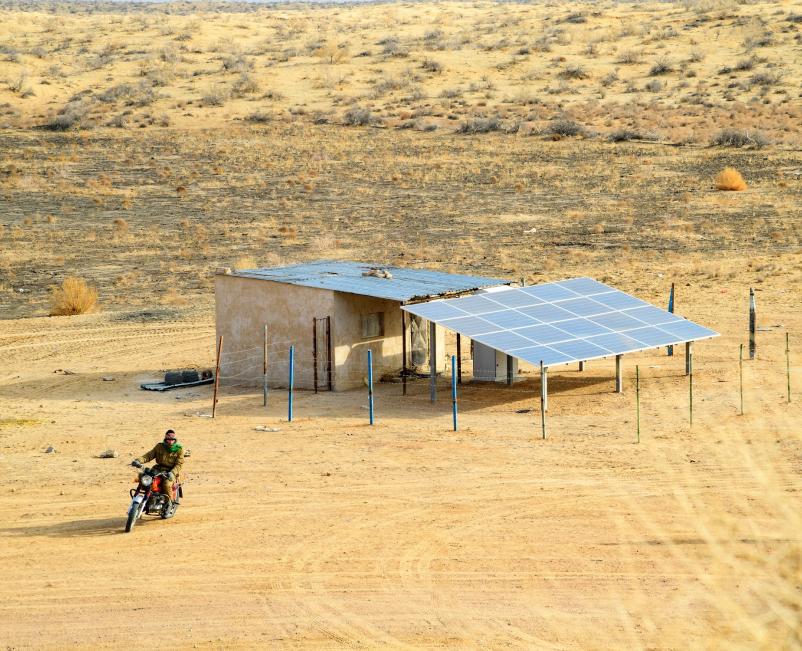
Increasing Water and Energy Efficiency
Water is a critical resource for socio-economic well-being and environment in Turkmenistan's hot, arid conditions. Agriculture is the single largest consumer of water in the country (88%). Climate change induced problems of desertification, land degradation, drought and water scarcity leading to farmers using ever-more irrigation to save their crops from drying out. However, due to outdated irrigation infrastructure and inefficient water management, around 50 percent of the water is lost between withdrawal and ultimate delivery.
Consequently, water management and energy efficiency in irrigated agriculture become a crucial factor, affecting the agriculture and environment and the sustainable livelihoods of the rural population.
UNDP Turkmenistan supports the country’s efforts to introduce the innovative water-saving irrigation technologies in agricultural crop production and environmentally sustainable water supply to support and enhance the social conditions and economic livelihood of the population of Turkmenistan.
UNDP promotes an integrated approach to water management that is energy and water efficient to reduce root causes of land degradation, GHG emissions in water sector and enhance local livelihoods.
As part of this support, UNDP invested in modern, water and energy efficient irrigation infrastructure in a 145-hectare pilot site “Green Prolygon” in the Gokdepe district of Ahal Province, which served as a research and demonstration site for testing various irrigation methodologies in crop production and was used as a scientific knowledge platform for evidence-based development of new and revising the outdated technical irrigation norms and regulatory papers in the water sector.
UNDP will continue to focus on developing renewable energy sources in Turkmenistan and the introduction of innovative energy efficiency technologies in the electricity industry, which will allow reducing greenhouse gas emissions, and thus, contribute to the country's efforts to fulfill its international obligations under the Paris Climate Agreement.
SUSTAINABLE and SAFE CITIES FOR A GREEN FUTURE
The population of cities worldwide is growing and is expected to reach 6.5 billion by 2050. Rapid urbanization has a negative impact on the human habitat and all living beings, destroying natural resources, affecting human health and bringing us closer to a climate catastrophe.
The same tendency is observed in Turkmenistan, where the number of urban populations exceeded rural in 2014, and this trend is accelerating. The growth of cities puts significant pressure on the existing energy, water and transport infrastructures and creates problems related to waste management and increased pollution.
At the same time the right urbanization policy can significantly improve the population’s standard of living, increase economic well-being, mitigate the effects of climate change and accelerate the achievement of the sustainable development goals.
UNDP supports reducing the negative impacts of urban growth in the country and promotes sustainable urban management and development strategies by implementing integrated solutions to reduce carbon emissions and increase resilience to climate change, focusing on fighting air pollution, implementing practices to reduce energy consumption, and improving the regulatory framework on energy conservation. We actively support national efforts on environmental monitoring, waste management, and sustainable urban transport and introduce green hotel standards in line with our efforts to build more inclusive, equitable and sustainable cities.
Preserved for hundreds of years, plastic leaches potentially toxic chemicals into the environment, endangering various ecosystems and affecting human health. Waste collection and disposal campaigns, initiated by UNDP and the Nature Protection Society of Turkmenistan have actively involved residents of the capital, students, schoolchildren, non-governmental organizations and representatives of the private sector and demonstrated UNDP’s commitment to stop plastic pollution and save the planet.
UNDP also promotes the use of alternative "green" transport to reduce the negative impact of transport on air quality and promotes environmentally sustainable behavior among the population.
UNDP builds the capacity of relevant national departments by introducing international “green” construction standards and discussing the possibility of introducing "green" standards in hotels of the National Tourist Zone “Avaza” to further contribute to the country's implementation of the obligations under the Paris Climate Agreement.
UNDP's Disaster Risk Reduction (DRR) work focuses on risk-informed development in line with the SDGs and the Sendai Framework for Disaster Risk Reduction. Around the world, UNDP is working with partners to strengthen national policies and institutional frameworks, ensure greater coherence in DRR and climate change adaptation, and strengthen preparedness and recovery efforts.
In Turkmenistan, we strengthen the country’s capacity to assess seismic risks and prevent and respond to potential earthquakes and associated cascading emergencies.

To encourage residents to use greener modes of transport, bicycle racks were installed in the sanatorium complex "Dayanch" located in the Awaza National Tourist Zone.
CLIMATE CHANGE EDUCATION
Education is critical to addressing climate change. In order to reduce the burden on the environment and ensure the sustainable use of the existing resources, minimize waste and reduce environmental pollution, it is necessary to instill nature-friendly behavior from an early age. With the support of partners, UNDP developed the “Climate Box” (Climate Box) – an interactive learning kit on climate change for schoolchildren, which was highly appreciated by experts, teachers and schoolchildren as well as low-income family children and teachers from different countries.
UNDP in Turkmenistan, together with the Ministry of Education of Turkmenistan, prepared and introduced into the primary school curriculum a version of the Climate Box adapted to the country’s context. Hundreds of teachers were able to apply the toolkit and knowledge during the lessons of Ecology, Geography, History and Biology using interactive teaching methods and inspiring children to lead an environmentally friendly lifestyle.
The Climate Box has evolved from an innovative toolkit into a comprehensive climate education programme that engages with the education ministries, schools, and informal and non-formal education activities, which resulted in decision to launch the project “Climate Education to Advance SDGs and Climate Action (Climate Box)” to support further implementation of the climate education curricula in Eastern Europe and Central Asia region, including Turkmenistan and advance the Climate Box curriculum with new innovative digital and online tools, as well as to support cross-country exchanges and cooperation.
UNDP trains and mobilizes the audience to take measures to counteract the climate crisis. We are raising awareness of the climate crisis through environmental campaigns to help people understand the impacts of pollution on human health and ecosystems and to encourage people to make more rational consumption choices.
We highlight the role of the younger generation as a key partner in the fight against climate change, increase youth environmental awareness and inspire the country's younger generation to actively participate in efforts to tackle climate change.
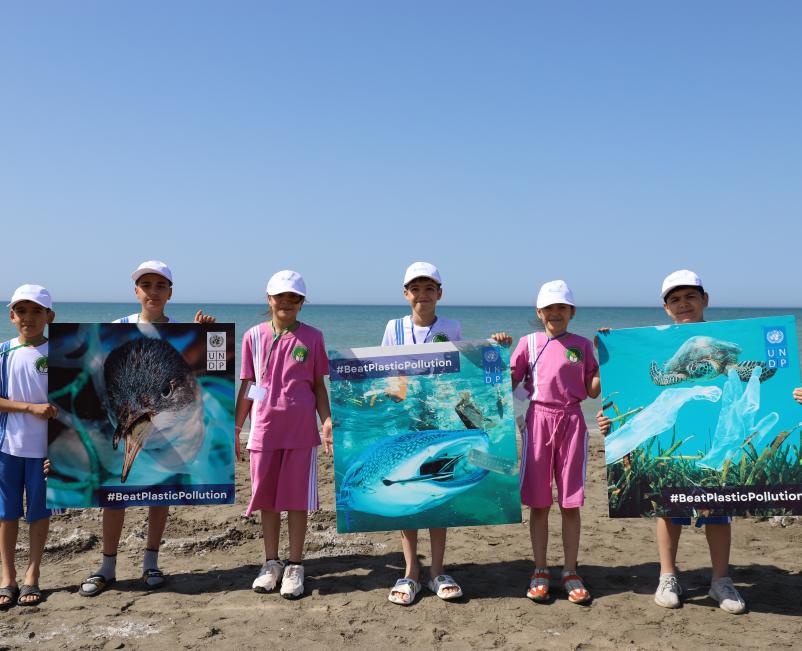
UNDP in Turkmenistan organized a number of initiatives to celebrate the World Bicycle Day and the World Environment Day with children from the sanatorium complex "Dayanch" located in the Awaza National Tourist Zone (June 2023).

 Locations
Locations
